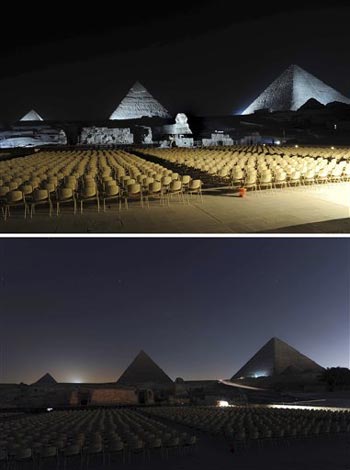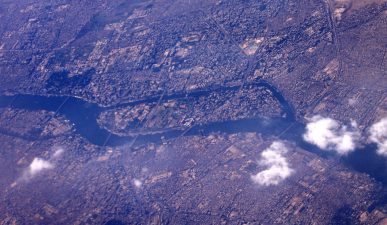 The Sphinx and the Great Pyramids of Giza shut off their lights for one hour on Saturday evening in Egypt to mark Earth Hour, a global protest for climate change initiatives. The whole world sat in darkness for one hour as an attempt to bring awareness to the growing concerns facing the planet in terms of global warming and climate change.
The Sphinx and the Great Pyramids of Giza shut off their lights for one hour on Saturday evening in Egypt to mark Earth Hour, a global protest for climate change initiatives. The whole world sat in darkness for one hour as an attempt to bring awareness to the growing concerns facing the planet in terms of global warming and climate change.
This was the second consecutive year that Egypt participated in the international event. Amal Habib, a 28-year-old photographer based in Cairo, visited the Cairo Tower at the assigned time. She was skeptical of promises by the Egyptian government to turn off the lights of the tower, but was gladly surprised to see the darkness.
“I was kind of shocked, but in a good way when I went to the tower expecting to show the lies of the government toward climate change initiatives, but I was wrong. The lights were off,” she said.
Minister of Environmental Affairs Maged George had announced earlier in the week Egypt’s official participation in the event, which included a number of governmental offices, institutions and major archaeological sits. The blackout was a shock to tourists, including Peter Howard, an American tourist who had thought about going to the Pyramids on Saturday night to view them in the spotlights that usually accompany them.
“When I asked my hotel concierge they said that for an hour they would be off, so I decided to relax and not go,” he said, adding that the move by Egypt to turn off the major sites was “a good move to show people that just a little action can go a long way.”
Other Arab nations participating in the event were Qatar, Oman, United Arab Emirates, Saudi Arabia and Kuwait.
Europe’s best known landmarks — including the Eiffel Tower, Big Ben and Rome’s Colosseum — fell dark Saturday along with Egypt’s fabled sites. Following Sydney’s Opera House and Beijing’s Forbidden City switching off, the rest of the world quickly followed suit, creating the largest global protest in the name of climate change to date.
Four thousand cities in more than 120 countries — starting with the remote Chatham Islands off the coast of New Zealand — voluntarily switched off Saturday to reduce energy consumption, though traffic lights and other safety features were unaffected, organizers said.
“Tackling climate change is urgent and vital to both safeguard our environment and our children’s future. We can make a difference if we act now and act together,” said British Prime Minister Gordon Brown, who switched off lights at his Downing Street residence in London.
But, the question arose in Egypt and across the Middle East, what impact will it have on climate change education? For Omar bin Taleb, an environmental consultant in Oman, who spoke to Bikya Masr via telephone on Sunday morning, he said that it will at least “get people thinking about” climate change and wondering why the lights went off.
“If we can reach a handful of people in convincing them of the importance of this kind of event, we will have succeeded,” he began. “It is important and the world must not stop. We, as humans, have to deal with climate change on a grassroots basis and learn how the power we consume affects the climate change and the planet.”
More on Earth Hour in the Middle East:
Dubai’s Burj Khalifa Will Tower in Darkness
Earth Hour 2009 Sweeps Across the Middle East
(Image via AP/Nasser Nouri, 2009)
(This post was first published on Bikya Masr)



